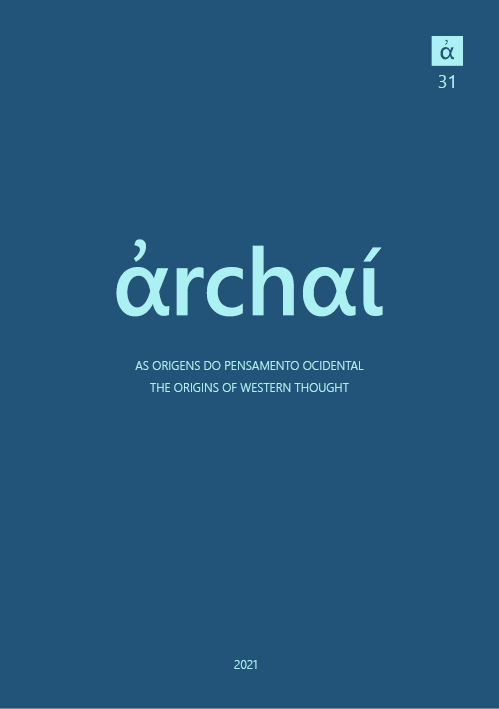Plato’s Protagoras on Who we Are?
DOI:
https://doi.org/10.14195/1984-249X_31_07Keywords:
origin, myth, creationism, progress, pietyAbstract
In Protagoras’ so called Great Speach, in Plato’s dialogue named after him, the Greek philosopher attributes the sophist a myth about the origin, development and nature of human beings, which has philosophical relevance. It is said that the gods created the mortal beings out of two elements, earth and fire. They assigned two titans, Epimetheus and Prometheus, to provide mortals with their faculties. Do this implies that creation had not been finished by the gods? To what extent do the gods entirely create human beings? Is this mith a creationist one? In this paper, the development of living beings is divided in four stages, and different hermeneutic and explanatory models are proposed to adress the myth and answer the questions raised before.
Downloads
References
BARRETT, J. (2001). Plato's Apology: Philosophy, Rhetoric, and the World of Myth. The Classical World95.1. p. 3-30.
BIESECKER-MAST, G. (1994). Innocence, truth, and wisdom in Gorgias’ palamedes and Plato's apology. Rhetoric Society Quarterly24.3-4. p. 148-166.
CALOGERO, G. (1957). Gorgias and the Socratic Principle Nemo Sua Sponte Peccat. Journal of Hellenic Studies77.1. p. 12-17.
CAMPOS DAROCA, J. (2003). Homero y la tragedia entre Antístenes de Atenas y Zenón de Citio. Ítaca. Quaderns Catalans de Cultura Clàssica19. p. 71-113.
CLAY, D. (1994). The Origin of the Socratic Dialogue. En: WAERDT,P. A. V.The Socratic Movement. Ithaca-London, Cornell University Press.
COLE, T. (1991). The Origins of Rhetoric in Ancient Greece. Baltimore, Johns Hopkins University Press.
COULTER, J. (1964). The Relation of the Apology of Socrates to Gorgias' Defense of Palamedes and Plato's Critique of Gorgianic Rhetoric.
Harvard Studies in Classical Philology68. p.269-303.
FEAVER, D.,HARE, J. (1981). The Apology As an Inverted Parody of Rhetoric. Arethusa 14. p.205-216.
FERBER, R. (2014). Introduction to ‘Sophistae’. En: DE LUISE,F.,STAVRU,A. (eds.).Socratica III.Sankt Augustine, Academia Verlag. p.201-203.
GOMPERZ, H. (1912). Sophistik und Rhetorik. Das Bildungsideal des eu legein in seinem Verhältnis zur Philosophie des V. Jahrhunderts. Leipzig, Teubner.
HINKS, D. (1940). Tisias and Corax and the Invention of Rhetoric. The Classical Quarterly34.1-2. p.61-69.
HUMBERT, J. (1931). Le pamphlet de Polycrates et le Gorgiasde Platon. Revue de Philologie 5. p. 20-77.
JANKO, R. (1987). Poetics with Tractatus Coislinianus, Reconstruction of Poetics II and the Fragments of the On Poets. Cambridge, Hackett.
KAHN, C. (1998). Plato and the Socratic Dialogue: The Philosophical Use of a Literary Form. Cambridge, Cambridge University Press.
MARSICO, C. (2005). Argumentar por caminos extremos: I) La imposibilidad de pensar lo que es. Gorgias y la instauración del criterio de verdad como coherencia de enunciados, y II) La necesidad de pensar lo que es. Antístenes y la fundamentación semántica de laverdad como adecuación. En: CASTELLO,L., MÁRSICO,C. (eds.) ¿Cómo decir lo real? El lenguaje como problema entre los griegos. Buenos Aires, GEA. p. 109-132.
MARSICO, C. (2007). Polémicas y paradigmas en la invención de la gramática. Córdoba, Ediciones del Copista, Serie Ordia Prima-Studia.
MARSICO, C. (2012). Sócrates y los socráticos, Cartas. Buenos Aires, Miluno.
MORI, F. (2018). Socrate, Palamede e l’empio processo: Declinazioni di un topos da Euripide a Senofonte. Maia: Rivista di letterature classiche70.2. p. 211-219.
NIGHTINGALE, A. (1995). Genres in dialogue.Plato and the Construct of Philosophy. Cambridge, CUP.
REEVE, C. (1989). Socrates in the Apology. Indianapolis, Hackett.
ROSSETTI, L. (1974-5). Alla ricerca dei logoi sokratikoiperduti (I-III). Rivista di Studi Classici22-3.
SCHIAPPA, E. (2017). The Development of Greek Rhetoric. The Oxford Handbook of Rhetorical Studies.Oxford, OUP. p. 33-42.
SEESKIN, K. (1982). Is the Apology of Socrates a Parody? Philosophy and Literature6. p. 94-105.SLINGS, S. (1994). Plato’s Apology of Socrates: A Literary and Philosophical Study with a Running Commentary, trans. E. De Strycker with an introduction by S. R. Slings. Leiden, Brill.
SLINGS, S. (1994). Plato’s Apology of Socrates: A Literary and Philosophical Study with a Running Commentary, trans. E. De Strycker with an introduction by S. R. Slings. Leiden, Brill.
STOKES, M. (1997). Apology of Socrates, trans. M. C. Stokes. Warminster, Aris & Phillips.
DE STRICKER, E., SLINGS, S. (2005). Plato’s Apology of Socrates. En: KAMTECKAR, R. Plato’s Euthyphro, Apology, and Crito. London, Rowman.
YOUTIE, H., MERKELBACH, R. (1968). Ein Michigan Papyrus über Theramenes. Zeitschrift für Papyrologie und Epigraphyk2. p. 161-169.
Downloads
Published
How to Cite
Issue
Section
License
Copyright (c) 2021 Irina Dereti´c

This work is licensed under a Creative Commons Attribution 4.0 International License.
Given the public access policy of the journal, the use of the published texts is free, with the obligation of recognizing the original authorship and the first publication in this journal. The authors of the published contributions are entirely and exclusively responsible for their contents.
1. The authors authorize the publication of the article in this journal.
2. The authors guarantee that the contribution is original, and take full responsibility for its content in case of impugnation by third parties.
3. The authors guarantee that the contribution is not under evaluation in another journal.
4. The authors keep the copyright and convey to the journal the right of first publication, the work being licensed under a Creative Commons Attribution License-BY.
5. The authors are allowed and stimulated to publicize and distribute their work on-line after the publication in the journal.
6. The authors of the approved works authorize the journal to distribute their content, after publication, for reproduction in content indexes, virtual libraries and similars.
7. The editors reserve the right to make adjustments to the text and to adequate the article to the editorial rules of the journal.



